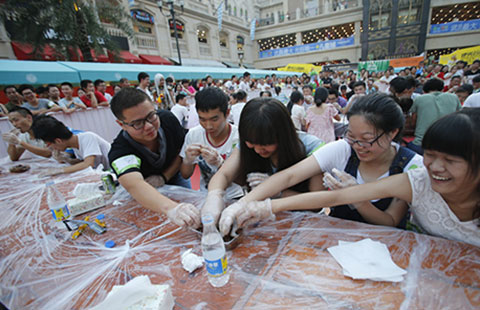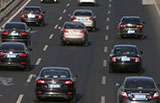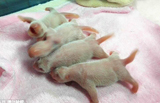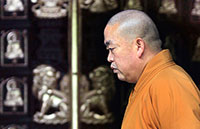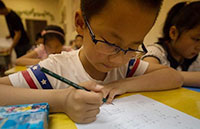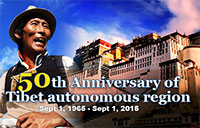Space program seeks a mother's touch
By Xin Dingding in Jiuquan, Gansu (China Daily) Updated: 2012-06-13 02:33China's astronauts are often affectionately called "superhuman beings", because they have to meet standards that seem, to lesser mortals, out of this world.
Because of the cramped living conditions in space, they cannot have body odor or bad breath. Those who suffer from chronic sore throats or runny noses will remain Earthbound. Neither can astronauts have ringworm, cavities or scars.
The first two female reserve astronauts, one of whom is likely to go into space on board Shenzhou IX and become China's first female astronaut, have to meet the same criteria as the men, said a senior medical expert from the astronaut selection panel.
But female astronauts have to meet extra conditions that are not applicable in other countries — they must be married and preferably mothers. This is because there are concerns that spaceflight, and the potential exposure to radiation, could harm their fertility.
"We have to act cautiously to protect astronauts, although there is no evidence of harm," Xu Xianrong, director of the People's Liberation Army's Clinical Aerospace Medicine Center in Beijing and a member of the selection panel, said.
Both female reserves were selected according to standards set for astronauts actually piloting a spacecraft.
These standards are stricter than those for a mission specialist, a job that demands less strength and is often allocated to women, Xu said.
Their physical condition must exceed even those set for fighter pilots. For instance, Xu said, astronauts cannot have arrhythmia, an irregular heartbeat, which can easily be triggered in space. Fighter pilots can fly with arrhythmia.
Too much calcium can also be a problem as the zero gravity in space means that astronauts could lose excessive amounts and suffer clogging in their blood vessels.
The thick spacesuits will aggravate any skin diseases. On top of this, their families must have a clean bill of health regarding contagious diseases, such as hepatitis.
Health records in various parts of the country will also be taken into account, he said.
For example, people in South China's Guangdong province and the Guangxi Zhuang autonomous region are more likely to develop nasopharyngeal cancer, while people in a county in Central China's Henan province have a high rate of esophageal cancer.
But Xu, who has participated in the selection process since the 1990s, believes that the "superhuman beings" were really only true for the first batch of 14 male reserve astronauts, selected between 1995 and 1997. This was a period when the selection panel had little experience and few useful references and had to screen for all potential problems.
But now that China has sent six astronauts into space, the criteria for selecting the second batch of two female and five male reserve astronauts in 2010, has been relaxed, he said.
The second batch of reserve astronauts do not have to meet requirements on their G endurance, as fighter pilots do. This measures the ability of the body to withstand extreme gravitational forces.
The criteria for combating hypoxia, lack of oxygen, is not as strict as it is for fighter pilots.
"I prefer not to use 'superhuman being' to describe our astronauts, because that could scare away potential candidates," he said.
As China has planned to build a space station by 2020, it will need more astronauts.
A new selection criteria is being drafted, Xu said.
The US has shown that it is possible for people in their 60s to go into space, and some astronauts have even undergone serious surgery, he said.
With the easing of standards, the manned space program will be a realistic goal that motivates a new generation, he said.
- Breast-feeding pushed for infant health
- Reshuffle brings in younger officers
- Beijing to ban vehicles for V-Day parade
- Emission limits to ensure blue sky for V-Day parade
- Chinese colleges admit visually impaired students
- Military leader calls for remembrance, stronger army
- Shaolin Abbot absent from Thai visit amid investigation rumours
- Mosquitoes released in fight against dengue fever
- Netizens decry loss at math Olympiad
- Think tank's membership rules amended
